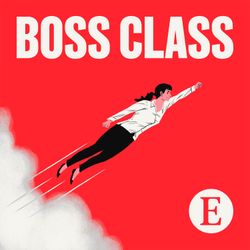Share

Boom! from The Economist
1. 1968 - Born to be wild
The generation born in the 1940s grew up in a land of endless growth and possibility, ruled by a confident, moderate elite. But just as they were embarking on adult life, all that started to come apart. The economy faltered, and the post-war consensus came under pressure from two sides: from the radical right, who hated government moves on civil rights – and from the ‘New Left’, as boomers rebelled against their parents' generation and its war in Vietnam.
To listen to the full series, subscribe to Economist Podcasts+.
If you’re already a subscriber to The Economist, you have full access to all our shows as part of your subscription. For more information about how to access Economist Podcasts+, please visit our FAQs page or watch our video explaining how to link your account.
More episodes
View all episodes

Trailer: Boom!
03:32|How did two old, unpopular men end up running for the world's most demanding job? It’s the question John Prideaux, The Economist’s US editor, gets asked the most. And the answer lies in the peculiar politics of the baby boomers. Since 1992, every American president bar one has been a white man born in the 1940s. That run looks likely to span 36 years - not far off the age of the median American. This cohort was born with aces in their pockets. Their parents defeated Nazism and won the cold war. They hit the jobs market at an unmatched period of wealth creation. They have benefitted from giant leaps in technology, and in racial and gender equality. And yet, their last act in politics sees the two main parties accusing each other of wrecking American democracy. As the boomers near the end of their political journey, John Prideaux sets out to make sense of their inheritance and their legacy. Launching July 2024.To listen to the full series, subscribe to Economist Podcasts+.If you’re already a subscriber to The Economist, you have full access to all our shows as part of your subscription. For more information about how to access Economist Podcasts+, please visit our FAQs page or watch our video explaining how to link your account.
2. 2. 1978 - I love the nightlife
52:31||Season 1, Ep. 2America was caught in a crisis of confidence, just as our boomers were leaving their youth behind. Their old 1960s dreams of transforming the country were gone, but new dreams of liberation took their place, from the women’s movement to a populist onslaught against big government – via Manhattan’s wildest nightclub.To listen to the full series, subscribe to Economist Podcasts+.If you’re already a subscriber to The Economist, you have full access to all our shows as part of your subscription. For more information about how to access Economist Podcasts+, please visit our FAQs page or watch our video explaining how to link your account.This episode draws on audio from: CBS, ABC, AP and Getty.
3. 3. 1987 - Little lies
46:58||Season 1, Ep. 3The American economy was thriving again. On Wall Street, boomers were making more money than they could have ever imagined. But from factory workers to Vietnam veterans to farmers, there were plenty of losers too. The question was whether Washington could hear them.To listen to the full series, subscribe to Economist Podcasts+.If you’re already a subscriber to The Economist, you have full access to all our shows as part of your subscription. For more information about how to access Economist Podcasts+, please visit our FAQs page or watch our video explaining how to link your account.This episode contains audio from the following publishers: C-SPAN, CBS, CNN, NPR, Channel 5, Hoover Institution Library, Los Angeles Lakers, Sherman Records.
4. 4. 1994 - Welcome to paradise
49:46||Season 1, Ep. 4The 1940s generation had lived their lives under the shadow of the Cold War. Now it was gone – and one of their number was in the White House at last, presiding over a booming, globalising economy. Bill Clinton had largely accepted Ronald Reagan’s economics. So was this the end of old antagonisms? Not so much.To listen to the full series, subscribe to Economist Podcasts+.If you’re already a subscriber to The Economist, you have full access to all our shows as part of your subscription. For more information about how to access Economist Podcasts+, please visit our FAQs page or watch our video explaining how to link your account.This episode contains audio from the following publishers: C-SPAN, AP, William J. Clinton Presidential Library, National Space Society, UVA Miller Center, NBC, Amazon, CNN, CBN, EIB, PBS, ABC, WLWD, WNET.
5. 5. 2008 - Fake empire
48:47||Season 1, Ep. 5The torch passed to a new generation. With the arrival of Barack Obama, it looked as though the boomers’ time was up. They deserved credit for building a country that would elect a black president. But then their other great legacy – an economy built on financial hyper-creativity and easy credit – exploded, releasing political forces this generation had too long ignored.To listen to the full series, subscribe to Economist Podcasts+.If you’re already a subscriber to The Economist, you have full access to all our shows as part of your subscription. For more information about how to access Economist Podcasts+, please visit our FAQs page or watch our video explaining how to link your account.This episode draws on audio from C-SPAN, The White House, CBS, Pat Garrett, Al-Jazeera, Koi Pond app, Alabama government archive, PBS, CNBC, ABC
6. 6. 2020 - Lost in yesterday
50:48||Season 1, Ep. 6The radical right was visible somewhere in the background all the way through the boomers’ lives. Now one of their number had made himself the hero of that movement and led it to power. Under the pressure of a pandemic, Americans had a choice. Should they give Donald Trump another chance? Or turn to another man of the 1940s, Joe Biden, who promised to rebuild the kind of economy in which he'd grown up. Unless it was all too late...To listen to the full series, subscribe to Economist Podcasts+.If you’re already a subscriber to The Economist, you have full access to all our shows as part of your subscription. For more information about how to access Economist Podcasts+, please visit our FAQs page or watch our video explaining how to link your account.This episode draws on audio from the following publishers: ABC, CNN, State Department, PBS, Washington Post, C-SPAN, PeteforAmerica, MSNBC, cover of John Lennon's "Imagine", Charles Cornell, VOA, CBC, NBC, CNBC
Trailer: Scam Inc
03:47|A sophisticated, predatory, multi-billion dollar industry is emerging from the shadows. It already rivals the size of the illicit drug trade. And it’s about to get bigger and much more powerful. The Economist’s Sue-Lin Wong follows a trail that starts with the collapse of a bank in rural Kansas to uncover a global, underground scam economy built around human trafficking, corruption and money laundering. Can it be stopped?Available now.To listen to the full series subscribe to Economist Podcasts+.
Trailer: Boss Class Season 2
02:03|Good bosses are rare. They don’t have to be. The skills of management can be learned.The Economist’s management columnist, Andrew Palmer, is here to help. The second season of Boss Class features leaders at some of the world’s best performing companies, from Levi’s to Novo Nordisk to Google. New episodes are out weekly starting May 12th. To listen to the full series, subscribe to Economist Podcasts+. https://subscribenow.economist.com/podcasts-plusIf you’re already a subscriber to The Economist, you have full access to all our shows as part of your subscription. For more information about how to access Economist Podcasts+, please visit our FAQs page or watch our video explaining how to link your account.